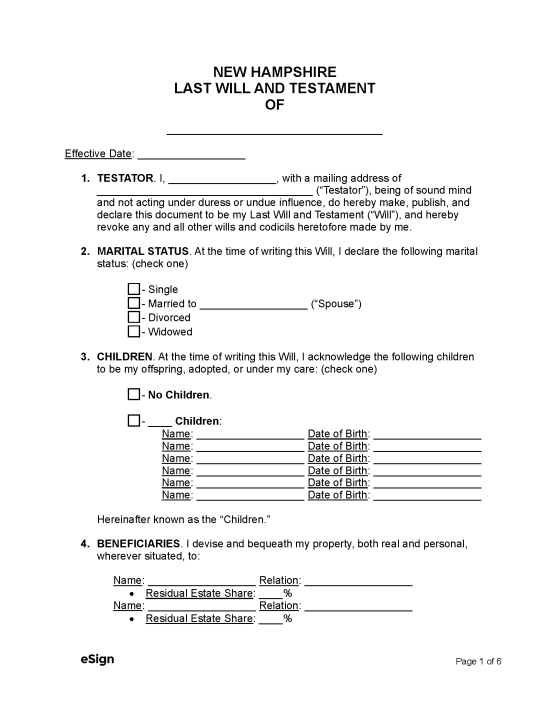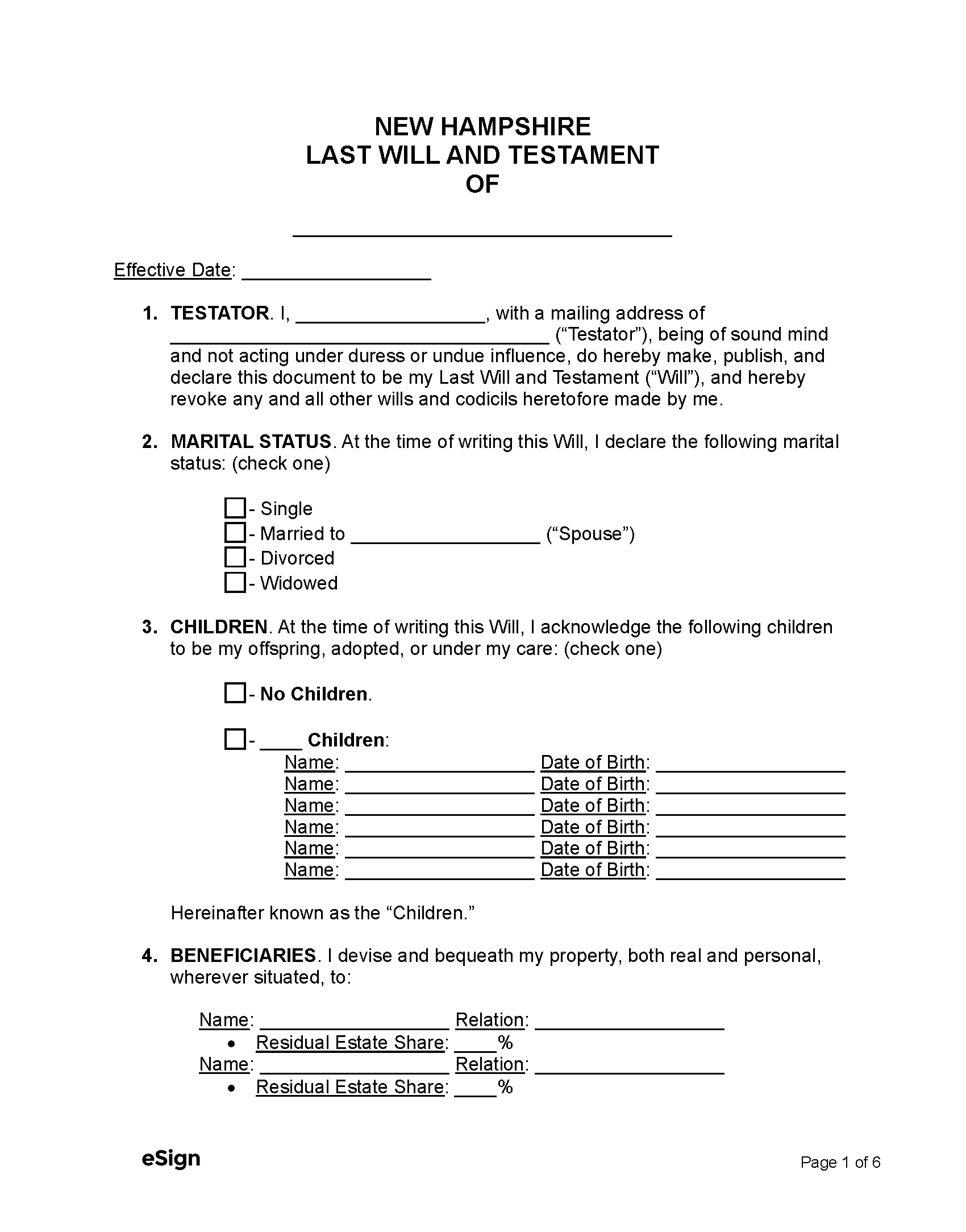State Laws
A last will and testament can be created by any mentally competent individual who is either at least 18 years old or a married person of a younger age.[1]
Holographic Wills – Handwritten wills are allowed, but they have the same requirements as any other will executed in New Hampshire.
Revocation – A will can be revoked by creating a new one, destroying the original, or drafting a revocation document.[2] Unless written otherwise, a divorce or annulment revokes gifts and powers granted to the former spouse.[3]
Signing Requirements – Must be signed by the testator in either the physical presence of two witnesses OR the electronic presence of two witnesses and a notarial officer who is either:[4]
- The NH attorney who drafted the will;
- An NH attorney supervising the non-NH attorney who drafted the will; or
- A paralegal under the supervision of the NH attorney who drafted the will.
If any gifts are made in the will to a witness or their spouse, two additional witnesses will need to sign.[5]
Probate Process in New Hampshire (7 Steps)
Probate is the legal process that verifies a will’s validity and distributes the estate to beneficiaries and creditors. All probate documents will be filed by the executor (personal representative) named in the will. If an executor wasn’t chosen, the court will appoint an administrator.
- Open Probate Case
- Obtain Surety Bond (If Applicable)
- Publish Notice of Appointment
- Take Inventory of Assets
- Settle Debts
- File & Pay Taxes
- Settle the Estate
1. Open Probate Case
A simplified probate process known as Waiver of Full Administration is available if the estate has a single beneficiary/heir and enough assets to pay off its debts.[6]
The executor must file the below documents within 30 days of the decedent’s death.[7] Paperwork will be submitted electronically through the circuit court’s filing system. Some of the court forms will be created automatically after the executor fills out an online questionnaire.
- Last Will and Testament
- Codicils (if any) – These are amendments to the will.
- Certified copy of death certificate
- Petition for Estate Administration (NHJB-2145-Pe)
- Appointment of Resident Agent (NHJB-2120-Pe) – Required if the executor lives out of state.
- Statement of Counsel as to Propriety of a Foreign Will/Codicil to be Admitted into Probate (NHJB-2146-Pe) – Required if the will was made out of state.
Filing fees must be paid throughout the probate process. Amounts vary depending on the estate’s value (see circuit court filing fees). Once filed, the probate case must stay open for at least six months.
2. Obtain Surety Bond (If Applicable)
For estates valued at $25,000 or above, the court may ask the executor to obtain a surety bond as an insurance policy on the decedent’s assets.[8] The court will determine the bond amount after assessing the probate case. The following companies provide surety bonds in New Hampshire:
3. Notice of Appointment
After the court has reviewed and accepted the necessary forms, they will send the executor a Certificate of Appointment (or Letter of Appointment). If the estate’s value exceeds $10,000, the court will publish a Notice of Appointment in local newspapers to notify the public that a probate case has been opened.[9]
4. Take Inventory of Assets
Once appointed, the executor must take inventory of the decedent’s assets, including real estate, personal property, personal/business investments, and cash. All assets must be reported in an Inventory of Fiduciary (NHJB-2125-Pe), with separate documents attached to detail each item and its value.
The executor must submit the Inventory of Fiduciary to the circuit court within 90 days after their date of appointment.[10]
5. Settle Debts
Estate debts must be paid off by the executor in the order of priority set by law.[11] If there isn’t enough money in the estate to pay off all the debts, the executor may need to sell some of the decedent’s assets to cover what’s owed.
If the asset that needs to be sold is real estate, permission must first be granted from the circuit court. Approval can be obtained by filing a Motion and License to Sell Real Estate to Pay Debts and Legacies of the Estate (NHJB-2136-Pe).[12]
Real estate not sold to pay off debts will pass to the decedent’s beneficiaries or heirs. When this happens, a Notice to Towns & Cities Pursuant to RSA 554:18 (NHJB-2142-Pe) must be filed with the town/city where the property is located and the circuit court handling the probate case.[13]
6. File & Pay Taxes
Executors are in charge of the following tax obligations:[14]
- Obtain TIN – An Application for Employer Identification Number (Form SS-4) must be filed with the Internal Revenue Service (IRS) to obtain a tax identification number for the estate.
- Pay Estate Taxes – A federal tax return may need to be filed and paid depending on the estate’s value, and all state estate and inheritance taxes must be paid.
- Unless an extension is received, tax returns must be filed within nine months of the decedent’s death. An estimated tax payment must be made to the IRS while the probate case remains open.
- File Decedent’s Tax Return – A final tax return must be filed with the IRS to report the income earned from the beginning of the year to the date of death.
7. Settle the Estate
An estate may be settled six months after the executor’s appointment date. If there are no outstanding claims, debts, or obligations concerning the estate, an expedited process known as Summary Administration can be used to close the case without additional court supervision.[15] Otherwise, regular administration is required.
Summary Administration Process
- An Assent for Summary Administration (NHJB-2122-Pe) must be signed by any individual with a beneficial interest in the estate (e.g., beneficiary, creditor).[16]
- All persons named in the will to inherit assets must sign a Receipt (NHJB-2139-Pe).
- A Motion for Summary Administration (NHJB-2149-Pe) must be filed along with the Asent for Summary Administration and Receipt forms.
After the Motion for Summary Administration is approved, the court will release the surety bond (if any) and close the probate case. The decedent’s assets may then be distributed.
Regular Administration Process
- File an Executor’s/Administrator’s Accounting (NHJB-2117-Pe).[17]
- The Accounting must be resubmitted every 12 months until the case closes.
- After the court approves the Accounting, the executor can distribute the estate assets.
- A Receipt detailing each distribution must be signed by the beneficiaries/heirs of the assets and filed with the court.
Once the above steps have been completed, the court will close the probate case and release the surety bond (if any) to the executor.

